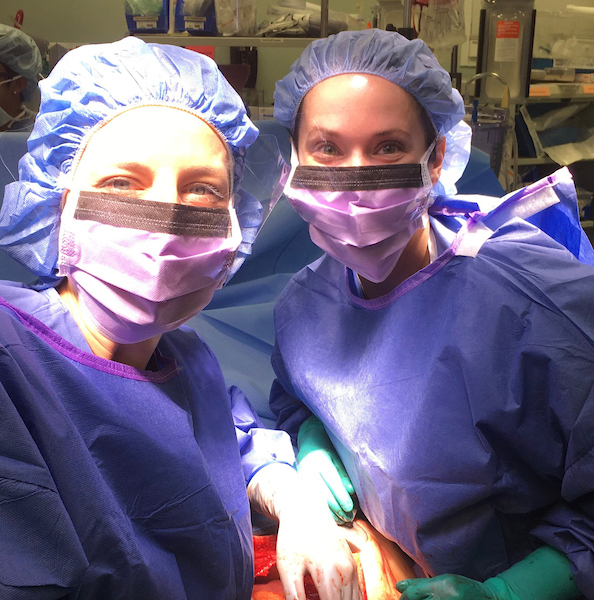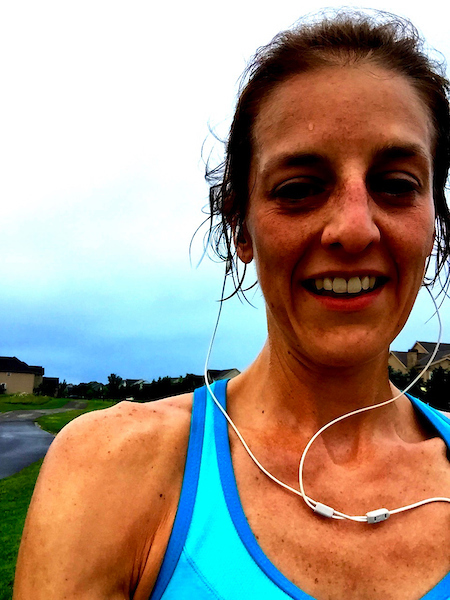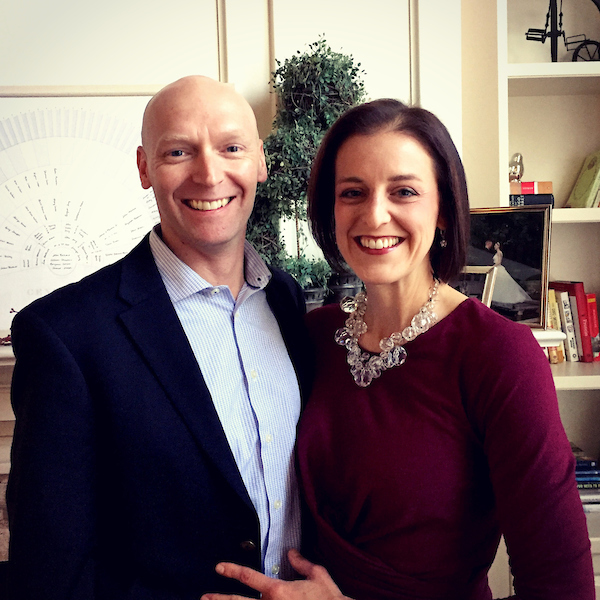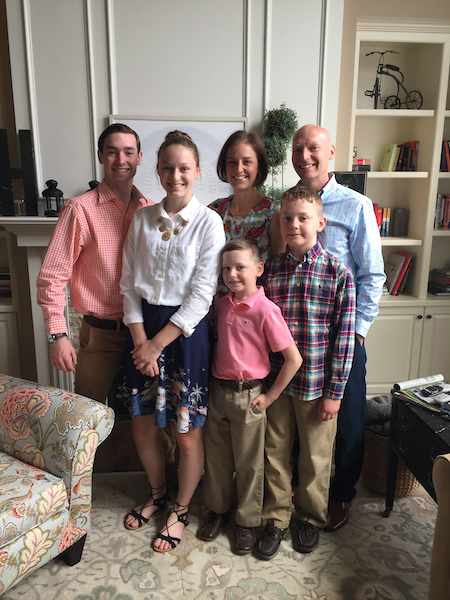The tough parts. They come in waves. They come randomly. They come expectedly.
Dr. Jennifer Hartwell stood in the operating room over his body. A man brought into IU Health Methodist Hospital with devastating injuries, multiple horrific injuries. It had been a crushing motorcycle accident.
There was no saving him. No surgeon could have. His injuries were not survivable.
“And yet I had him in the operating room and I felt horrible when I couldn’t save him,” says Dr. Hartwell, a trauma surgeon inside one of the busiest Level I trauma centers in the nation. “Those are bad because those stick with you.”
The tough parts, though, sometimes turn to wonderful. Being a trauma surgeon is a string of highs and lows. Victories and defeats. One can change to the next in a moment.
But in the end, what stands out are the people that Dr. Hartwell cares for. Many getting better. Some taking their last breaths before her eyes. Others brought in without a chance of survival, yet she gives every last ounce of strength she has to bring them back.
“There are those patients who really stick out. I can remember their names. I can remember their injuries. I can picture them,” says Dr. Hartwell, who came to Methodist a year and a half ago. “And sometimes, the cases just pierce your soul.”
***
Trauma is the glamorous made-for-TV part of medicine. It’s the stuff filled with drama, blood and sweat.
Dr. Hartwell sees it all. The gunshot victims and stabbings. But those make up just 10 percent of trauma cases at Methodist.
 Most of her patients average 45 years old. Many are elderly. The most common cause of trauma is from falls, followed by motor vehicle accidents.
Most of her patients average 45 years old. Many are elderly. The most common cause of trauma is from falls, followed by motor vehicle accidents.
When she’s on call, Dr. Hartwell will touch 20 patients in one shift. In a year, she sees more than 600. Often, she gets to deliver amazing news to families. Often, she doesn’t.
“The worst part of my job is having to go and tell a family bad news,” says Dr. Hartwell, a married mother of four.
After all, how do you walk up to a mother and tell her that her son has died? How do you tell a husband that his wife may not make it through the night?
Dr. Hartwell has settled on doing this part of the job her own way. She always asks a chaplain to join her. She takes a few minutes to get presentable. That might mean taking off her surgery cap or getting a drink of water. It may mean changing scrubs if they are soiled from the operation.
“Then I take a deep breath,” she says. “And I say a little prayer.”
She asks only key family members be present, perhaps the parents or a spouse and a close support person. And she starts each conversation the same way: “Hi, I’m Dr. Hartwell. I’m the one who has been taking care of your loved one. Tell me what you already know.”
Sometimes, the families just have a sense. They know it’s bad. Other times, the families know nothing. They’ve just been told that their loved one has been in a car accident and taken to Methodist.
“I let them tell me and I go from there,” she says. “And I usually try to be very brief and I usually say just a couple words letting them know what happened.”
And if she has to give the impossible news that a patient has died, “I say, ‘We did everything we possibly could but he has died.’”
“I force myself to say the word ‘died’ because in that moment people don’t process ‘passed away’ or ‘we lost him,’” Dr. Hartwell says. “As hard as it is to say that, I’ve learned that I need to be succinct but truthful and accurate and say those words.”
Death. It’s a part of life for a trauma surgeon. How Dr. Hartwell goes from stopping the gush of blood on a patient and watching tragedy unfold to living a normal life outside the hospital with her husband and four children is unthinkable.
 Finding the space between the two extremes of emotions is key, she says. The space between getting too emotionally involved and becoming numb to it all.
Finding the space between the two extremes of emotions is key, she says. The space between getting too emotionally involved and becoming numb to it all.
“For me, it’s a combination of making sure my head and my body and my heart are in the right space,” she says. “Which is why I am a diligent reader, runner and writer. That gets me in my right space.”
And Dr. Hartwell is deliberate about leaving work when she goes home. And being focused on patients when at work. Of course, it’s never perfect.
“Sometimes, we hit the mark,” she says. “And sometimes we don’t.”
***
Born in Troy, Ohio, a small town just north of Dayton, Dr. Hartwell grew up thinking she wanted to be a teacher.
No one else in her family had a medical background, except her grandmother, who was a nurse and met Dr. Hartwell’s grandfather taking care of him during World War II.
Both of her parents were counselors. Her dad, now retired, was a licensed professional clinical counselor who ran the counseling center at their church as well as the outreach and non-profit ministries.
Her mom started out as a home economics teacher, but then got a master’s degree and was a guidance counselor for a career technical center.
The family jokes that Dr. Hartwell’s younger brother, a police officer, and she, a trauma surgeon, certainly veered from their parents’ jobs in “feelings.”
But one summer before college, Dr. Hartwell became mesmerized with a documentary on PBS. It was called “M.D. – The Making of A Doctor.” The series followed seven people through Harvard Medical School.
“That just captured me big time,” Dr. Hartwell says. “And I said, ‘That’s what I want to do.’”
So she switched her major from education to zoology, the closest thing to a pre-med degree that Miami University had, and soaked in all she could studying life systems.
 After college graduation, she put her medical school on hold to follow her husband, Scott, who was in the military, to Fort Campbell in Kentucky. She taught middle and high school science – and loved it. But not enough to deter her from her “Making of a Doctor” dreams.
After college graduation, she put her medical school on hold to follow her husband, Scott, who was in the military, to Fort Campbell in Kentucky. She taught middle and high school science – and loved it. But not enough to deter her from her “Making of a Doctor” dreams.
When the couple moved back to Ohio, Dr. Hartwell made it happen. She went to medical school at Wright State University, and then did five years of general surgery training at University of Illinois at Chicago.
It was there, in her third year of residency, when she discovered that trauma was where she wanted to be. She had seen surgical oncology and vascular surgery and all the other specialties. When she went through trauma, she thought, “These are my people.”
“I just really like the team aspect of taking care of trauma patients. I like the immediate gratification of taking care of trauma patients,” Dr. Hartwell says. “They are sick and injured and you can take them from being super, super sick to really turning the corner and making them better really fast.”
***
Trauma takes a certain type of person. “But isn’t it great everyone is different and likes different things?” Dr. Hartwell says.
For Dr. Hartwell, who before coming to Methodist was at Grant Medical Center in Columbus, the adrenaline rush and fast-paced world of trauma draws her in.
“We see a patient and within the first two minutes I’ve got to decide, ‘Should we give them blood? Do they need to go to the operating room? What cat scans do I need? Do I need cat scans at all?’” says Dr. Hartwell, who did a 1-year fellowship in Memphis at University of Tennessee Health Science Center. “I have to make very quick decisions.”
It’s all about taking in the big picture and asking, “What is most important now?” she says.
And even as Dr. Hartwell sees the tough parts and the great parts and the devastating cases that pierce her soul, she always comes to the same conclusion.
“I’m so thankful for my job,” Dr. Hartwell says. “I’ve got the greatest job in the world.”
More on Dr. Hartwell
 Personal: She married Scott, a financial and risk analyst, right out of college. Before medical school, Dr. Hartwell had her first son, Jack, now 17. During medical school, she had daughter Allie, now 14. As a third year resident, she had Ben, now 9, and as a senior surgical resident, she had Sam, now 8.
Personal: She married Scott, a financial and risk analyst, right out of college. Before medical school, Dr. Hartwell had her first son, Jack, now 17. During medical school, she had daughter Allie, now 14. As a third year resident, she had Ben, now 9, and as a senior surgical resident, she had Sam, now 8.
Balancing it all: “People always want to talk about work life balance and I don’t really believe in work life balance. I just believe in life,” she says. “This is my life. The two of us, we have two careers and four kids and we just make it work. All throughout my education and training and to this day, my husband deserves all the credit for making this happen. He’s amazing and a super dad.”
Outside of Methodist: Dr. Hartwell is an avid runner and just finished her first marathon. She loves to cook and try new recipes and all her disposable income goes to travel. She journals and does devotion each morning and writes a blog traumamom4.com, the musings of being a mom, a surgeon and a runner. At night, she reads mostly nonfiction but will throw in fiction every now and then for “brain candy.”
Her research interest: Nutrition support for trauma patients, specifically critically ill patients getting nutrition through a feeding tube. “Patients who are really injured, they need more calories and more protein to heal,” she says. “If we aren’t super diligent about putting the feeding tube in and calculating what calories and protein they need and getting it to them, then they fall behind really fast. Nutrition matters a lot.”
Professional involvement: Dr. Hartwell is part of the Eastern Association for the Surgery of Trauma (EAST), Western Trauma Association (WTA), The American Association for the Surgery of Trauma (AAST), American College of Surgeons, Society of Critical Care Medicine (SCCM) and the American Society for Parenteral and Enteral Nutrition (ASPEN).
— By Dana Benbow, Senior Journalist at IU Health.
Reach Benbow via email dbenbow@iuhealth.org or on Twitter @danabenbow.
